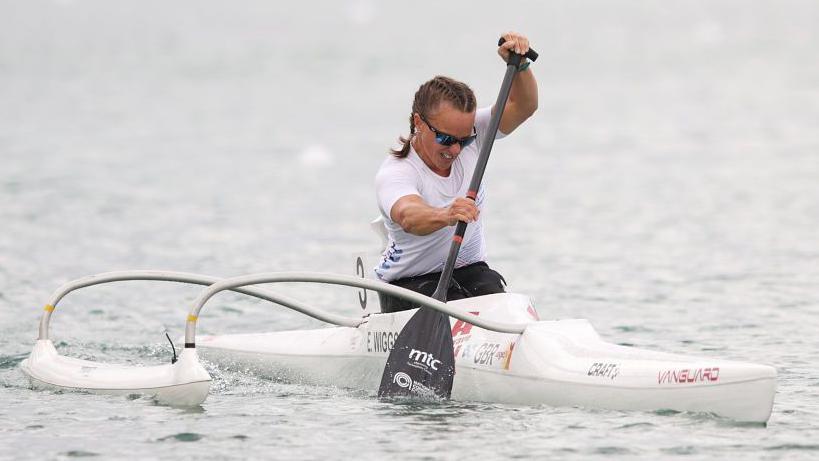Paralympics 2024: A guide to Para-canoe at the Paris Games

Before taking up Para-canoeing, Emma Wiggs competed in sitting volleyball at London 2012
- Published
Key information
Dates: 6-8 September
Venue: Vaires-sur-Marne Nautical Stadium
Gold medals on offer: 10
How does Para-canoe work?
The Para-canoe programme encompasses races in two boats - the kayak (KL) and va'a (VL). Kayak events were raced for the first time at Rio 2016 while the va'a made its debut in Tokyo.
The Paralympic kayak has a wider bottom than the Olympic eqivalent for greater stability and athletes use a double-bladed paddle. The va’a has an outrigger attached to one side of the boat to help balance and a single-blade paddle is used.
Both events feature intensive sprints over 200 metres in lanes.
KL1 athletes have no or very limited trunk function and no leg function and typically need a special seat with high backrest in the kayak.
KL2 athletes have partial trunk and leg function and while able to sit upright in the kayak might need a special backrest and have limited leg movement during paddling.
KL3 athletes have trunk function and partial leg function, are able to sit with their trunk in a forward flexed position in the kayak and are able to use at least one leg or prosthesis.
VL2 athletes are given a score depending on their trunk function and leg function and the class includes athletes who score lower in the one function than the other.
VL3 athletes have full or almost full dynamic trunk function.
Who is in the GB squad?
Great Britain have led the way in the sport since its Games debut in 2016 and the team for Paris features three defending Paralympic champions - Emma Wiggs, Charlotte Henshaw and Laura Sugar - who will all be aiming to retain their titles.
Wiggs is already the sport's most successful athlete with two golds and a silver and multiple world and European titles since making her international debut in 2013, while Henshaw and Sugar moved after successful careers in swimming and athletics respectively.
Jeanette Chippington will be competing in her eighth Games at the age of 54 having made her debut as a swimmer in 1988 in Seoul before switching sports, while Hope Gordon will make her summer Games debut having competed in Para Nordic skiing at the 2022 Winter Paralympics in Beijing.
On the men's side, Rob Oliver will hope to improve on his Tokyo bronze along with debutants Jack Eyers and Ed Clifton. Dave Phillipson is competing in his second Games as a canoeist after three as a wheelchair tennis player.
Who are the other challengers?
GB topped the medal table at the past two World Championships in 2023 and 2024 with Brazil, Australia and Ukraine among the leading challengers.
Australia's Curtis McGrath will be aiming for a third consecutive KL2 title having also won VL3 gold in Tokyo. McGrath took up the sport after having both legs amputated as a result of a mine blast while serving with the Australian Army in Afghanistan.
Hungary's Peter Pal Kiss became the youngest Paralympic canoe champion in Tokyo aged 18 and will be a strong contender again in the KL1 event.
And Brazil's Fernando Rufino de Paulo, known as the Steel Cowboy because of his sideline as a rodeo bull rider and surviving 80 accidents, became the first VL2 Paralympic gold medallist in Tokyo and will hope for a repeat in Paris.
Did you know?
Britain's Jack Eyers has made a journey from catwalk to canoe. After having his right leg amputated when he was 16, in 2017 he became the first amputee to be crowned Mr England and has modelled at London and New York Fashion Weeks. Since joining the GB Para-canoe squad he has won two VL3 world titles and a European gold and will hope to complete the set in Paris.
ParalympicsGB Tokyo 2020 medals
Seven - three gold (Emma Wiggs, Charlotte Henshaw and Laura Sugar), one silver (Wiggs) and three bronze (Robert Oliver, Stuart Wood and Jeanette Chippington)